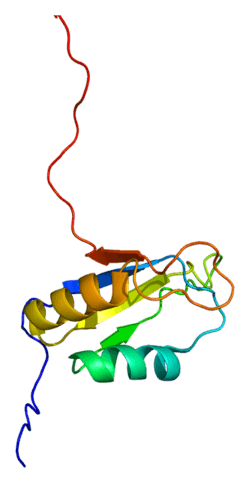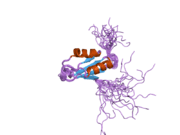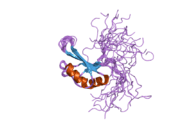CUGBP Elav-like family member 4
| View/Edit Human | View/Edit Mouse |
CUGBP Elav-like family member 4 (CELF4) also known as bruno-like protein 4 (BRUNOL4) is a protein that in humans is encoded by the CELF4 gene.[3][4]
Function
Members of the CELF/BRUNOL protein family contain two N-terminal RNA recognition motif (RRM) domains, one C-terminal RRM domain, and a divergent segment of 160-230 aa between the second and third RRM domains. Members of this protein family regulate pre-mRNA alternative splicing and may also be involved in mRNA editing, and translation. Several transcript variants encoding different isoforms have been found for this gene, but their full-length nature has not been determined yet.[4]
References
- ↑ "Human PubMed Reference:".
- ↑ "Mouse PubMed Reference:".
- ↑ Good PJ, Chen Q, Warner SJ, Herring DC (Oct 2000). "A family of human RNA-binding proteins related to the Drosophila Bruno translational regulator". J Biol Chem. 275 (37): 28583–92. doi:10.1074/jbc.M003083200. PMID 10893231.
- 1 2 "Entrez Gene: BRUNOL4 bruno-like 4, RNA binding protein (Drosophila)".
Further reading
- Szafranski K, Schindler S, Taudien S, et al. (2008). "Violating the splicing rules: TG dinucleotides function as alternative 3' splice sites in U2-dependent introns.". Genome Biol. 8 (8): R154. doi:10.1186/gb-2007-8-8-r154. PMC 2374985
 . PMID 17672918.
. PMID 17672918. - Han J, Cooper TA (2005). "Identification of CELF splicing activation and repression domains in vivo.". Nucleic Acids Res. 33 (9): 2769–80. doi:10.1093/nar/gki561. PMC 1126903
 . PMID 15894795.
. PMID 15894795. - Singh G, Charlet-B N, Han J, Cooper TA (2004). "ETR-3 and CELF4 protein domains required for RNA binding and splicing activity in vivo.". Nucleic Acids Res. 32 (3): 1232–41. doi:10.1093/nar/gkh275. PMC 373409
 . PMID 14973222.
. PMID 14973222. - Tchernev VT, Mansfield TA, Giot L, et al. (2002). "The Chediak-Higashi protein interacts with SNARE complex and signal transduction proteins.". Mol. Med. 8 (1): 56–64. PMC 2039936
 . PMID 11984006.
. PMID 11984006. - Ladd AN, Charlet N, Cooper TA (2001). "The CELF family of RNA binding proteins is implicated in cell-specific and developmentally regulated alternative splicing.". Mol. Cell. Biol. 21 (4): 1285–96. doi:10.1128/MCB.21.4.1285-1296.2001. PMC 99581
 . PMID 11158314.
. PMID 11158314. - Bonaldo MF, Lennon G, Soares MB (1997). "Normalization and subtraction: two approaches to facilitate gene discovery.". Genome Res. 6 (9): 791–806. doi:10.1101/gr.6.9.791. PMID 8889548.
This article is issued from Wikipedia - version of the 6/6/2016. The text is available under the Creative Commons Attribution/Share Alike but additional terms may apply for the media files.


